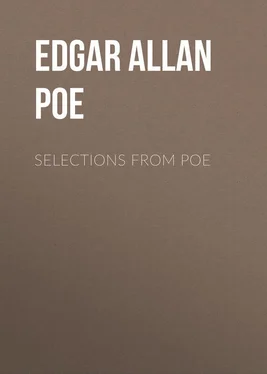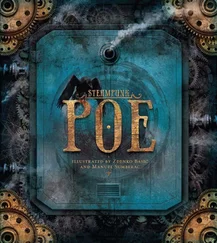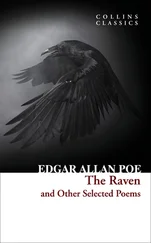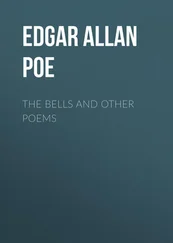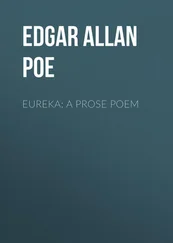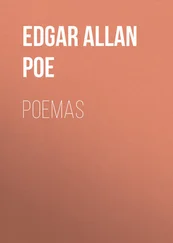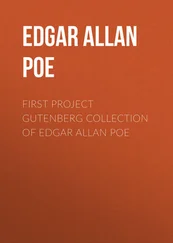Edgar Poe - Selections from Poe
Здесь есть возможность читать онлайн «Edgar Poe - Selections from Poe» — ознакомительный отрывок электронной книги совершенно бесплатно, а после прочтения отрывка купить полную версию. В некоторых случаях можно слушать аудио, скачать через торрент в формате fb2 и присутствует краткое содержание. Жанр: literature_19, foreign_antique, foreign_prose, на английском языке. Описание произведения, (предисловие) а так же отзывы посетителей доступны на портале библиотеки ЛибКат.
- Название:Selections from Poe
- Автор:
- Жанр:
- Год:неизвестен
- ISBN:нет данных
- Рейтинг книги:3 / 5. Голосов: 1
-
Избранное:Добавить в избранное
- Отзывы:
-
Ваша оценка:
- 60
- 1
- 2
- 3
- 4
- 5
Selections from Poe: краткое содержание, описание и аннотация
Предлагаем к чтению аннотацию, описание, краткое содержание или предисловие (зависит от того, что написал сам автор книги «Selections from Poe»). Если вы не нашли необходимую информацию о книге — напишите в комментариях, мы постараемся отыскать её.
Selections from Poe — читать онлайн ознакомительный отрывок
Ниже представлен текст книги, разбитый по страницам. Система сохранения места последней прочитанной страницы, позволяет с удобством читать онлайн бесплатно книгу «Selections from Poe», без необходимости каждый раз заново искать на чём Вы остановились. Поставьте закладку, и сможете в любой момент перейти на страницу, на которой закончили чтение.
Интервал:
Закладка:
This idea of a short story should be kept in mind in reading Poe's works, for he applied his theory perfectly.
The stories are of greater variety than the poems. There are romances of death whose themes are fear, horror, madness, catalepsy, premature burial, torture, mesmerism, and revengeful cruelty; tales of weird beauty; allegories of conscience; narratives of pseudo-science; stories of analytical reasoning; descriptions of beautiful landscapes; and what are usually termed "prose poems." He also wrote tales grotesque, humorous, and satirical, most of which are failures. The earlier tales are predominantly imaginative and emotional; most of the later ones are predominantly intellectual. None of the tales touches ordinary, healthy life; there is scarcely a suggestion of local color; the humor is nearly always mechanical; there is little conversation and the characters are never normal human beings. Although the stories are strongly romantic in subject, plot, and setting, there is an extraordinary realism in treatment, a minuteness and accuracy of detail equaling the work of Defoe. This is one secret of the magical art that not only transports us to the world of dream and vision where the author's own soul roamed, but for the time makes it all real to us.
Poe's finest tale, as a work of art, is "The Fall of the House of Usher," which is as nearly perfect in its craftsmanship as human work may be. It is a romance of death with a setting of profound gloom, and is wrought out as a highly imaginative study in fear – a symphony in which every touch blends into a perfect unity of effect. "Ligeia," perhaps standing next, incorporating "The Conqueror Worm" as its keynote, portrays the terrific struggle of a woman's will against death. "The Masque of the Red Death," a tale of the Spirit of Pestilence and of Death victorious over human selfishness and power, is a splendid study in somber color. "The Assignation," a romance of Venice, is also splendid in coloring and rich in decorative effects, presenting a luxury of sorrow culminating in romantic suicide. "William Wilson" is an allegory of conscience personified in a double, the forerunner of Stevenson's "Dr. Jekyll and Mr. Hyde." Other conscience stories are "The Man of the Crowd"; "The Tell-Tale Heart," also depicting insanity; and "The Black Cat," of which the atmosphere is horror. "The Adventures of One Hans Pfaal" and "The Balloon Hoax" are examples of the pseudo-scientific tales, which attain their verisimilitude by diverting attention from the improbability or impossibility of the general incidents to the accuracy and naturalness of details. In "The Descent into the Maëlstrom," scientific reasoning is skillfully blended with imaginative strength, poetic description, and stirring adventure. This type of story is clearly enough the original of those of Jules Verne and similar writers. "The Murders in the Rue Morgue" and "The Purloined Letter" are the pioneer detective stories, Dupin the original Sherlock Holmes, and they remain the best of their kind, unsurpassed in originality, ingenuity, and plausibility. Another type of the story of analytical reasoning is "The Gold-Bug," built around the solution of a cryptogram, but also introducing an element of adventure. Poe's analytical power was real, not a trick. If he made Legrand solve the cryptogram and boast his ability to solve others more difficult, Poe himself solved scores sent him in response to a public magazine challenge; if Dupin solved mysteries that Poe invented for him, Poe himself wrote in "Marie Roget," from newspaper accounts, the solution of a real murder mystery, and astounded Dickens by outlining the entire plot of "Barnaby Rudge" when only a few of the first chapters had been published; if he wrote imaginatively of science, he in fact demonstrated in "Maelzel's Chess Player" that a pretended automaton was operated by a man. "Hop Frog" and "The Cask of Amontillado" are old-world stories of revenge. "The Island of the Fay" and "The Domain of Arnheim" are landscape studies, the one of calm loveliness, the other of Oriental profusion and coloring. "Shadow" and "Silence" are commonly classed as "prose poems," the former being one of Poe's most effective productions. "Eleonora," besides having a story to tell, is both a prose poem and a landscape study, and withal one of Poe's most exquisite writings.
Although Poe was not a great critic, his critical work is by no means valueless. He applied for the first time in America a thoroughgoing scrutiny and able, fearless criticism to contemporary literature, undoubtedly with good effect. His attacks on didacticism were especially valuable. His strength as a critic lay in his artistic temperament and in the incisive intellect that enabled him to analyze the effects produced in his own creations and in those of others. His weaknesses were extravagance; a mania for harping on plagiarism; lack of spiritual insight, broad sympathies, and profound scholarship; and, in general, the narrow range of his genius, which has already been made sufficiently clear. His severity has been exaggerated, as he often praised highly, probably erring more frequently by undue laudation than by extreme severity. Though personal prejudice sometimes crept into his work, especially in favor of women, yet on the whole he was as fair and fearless as he claimed to be. Much of the hasty, journalistic hack work is valueless, as might be expected, but he wrote very suggestively of his art, and nearly all his judgments have been sustained. Moreover, he met one supreme test of a critic in recognizing unknown genius: Dickens he was among the first to appraise as a great novelist; Tennyson and Elizabeth Barrett (Browning) he ranked among the great poets without hesitation; and at home he early expressed a due appreciation of Hawthorne, Lowell, Longfellow, and Bryant.
Poe's place, both in prose and poetry, is assured. His recognition abroad has been clear and emphatic from the first, especially in France, and to-day foreigners generally regard him as the greatest writer we have produced, an opinion in which a number of our own critics and readers concur. One's judgment in the matter will depend upon the point of view and the standards adopted; it is too large a subject to consider here, but if artistic craftsmanship be the standard, certainly Hawthorne would be his only rival, and Hawthorne was not also a poet. The question of exact relative rank, however, it is neither possible nor important to settle. It is sufficient to say, in the words of Professor Woodberry, "On the roll of our literature Poe's name is inscribed among the few foremost, and in the world at large his genius is established as valid among all men."
BIBLIOGRAPHY
The year after Poe's death there appeared "The Works of the Late Edgar Allan Poe," with a Memoir, in two volumes, edited by R. W. Griswold and published by J. S. Redfield, New York. The same editor and publisher brought out a four-volume edition in 1856. Griswold had suffered from Poe's sharp criticisms and had quarreled with him, though later there was a reconciliation, and Poe himself selected Griswold to edit his works. The biographer painted the dead author very black indeed, and his account is now generally considered unfair.
In 1874-1875 "The Works of Edgar Allan Poe," with Memoir, edited by John H. Ingram, were published in four volumes, in Edinburgh, and in 1876 in New York. Ingram represents the other extreme from Griswold, attempting to defend practically everything that Poe was and did.
In 1884 A. C. Armstrong & Son, New York, brought out "The Works of
Edgar Allan Poe" in six volumes, with an Introduction and Memoir by
Richard Henry Stoddard. Stoddard is far from doing justice to Poe either as man or as author.
Although Griswold's editing was poor, subsequent editions followed his until 1895, when Professor George E. Woodberry and Mr. Edmund Clarence Stedman published a new edition in ten volumes through Stone & Kimball, Chicago (now published by Duffield & Company, New York). This edition is incomparably superior to all its predecessors, going to the original sources, and establishing an authentic text, corrected slightly in quotations and punctuation. Professor Woodberry contributed a Memoir, and Mr. Stedman admirable critical articles on the poems and the tales. Scholarly notes, an extensive bibliography, a number of portraits, and variorum readings of the poems, are included.
Читать дальшеИнтервал:
Закладка:
Похожие книги на «Selections from Poe»
Представляем Вашему вниманию похожие книги на «Selections from Poe» списком для выбора. Мы отобрали схожую по названию и смыслу литературу в надежде предоставить читателям больше вариантов отыскать новые, интересные, ещё непрочитанные произведения.
Обсуждение, отзывы о книге «Selections from Poe» и просто собственные мнения читателей. Оставьте ваши комментарии, напишите, что Вы думаете о произведении, его смысле или главных героях. Укажите что конкретно понравилось, а что нет, и почему Вы так считаете.
